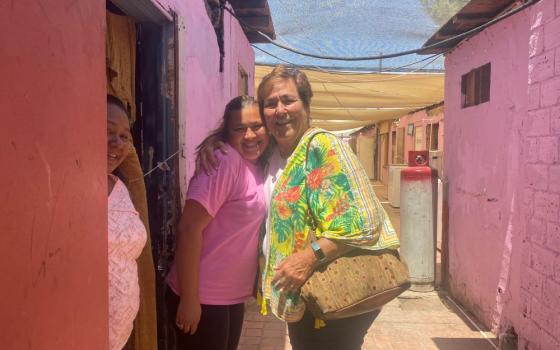
Over 70 theologians, pastors and ministers from North, Central and South America attended the bilingual conference "Synodality in America: People on the Move, Dialogue, and New Contexts." The University of San Diego's Portman Endowment and the Ecclesia in America Network organized this conference from Feb. 6-9 at the U.S.-Mexico border in California. (Luis Donaldo González)
Four months after the conclusion of the Synod on Synodality and amidst a convulsive change in migration policies across the Americas, the Ecclesia in America Network held its meeting "Synodality in America: People on the Move, Dialogue, and New Contexts," at the University of San Diego.
"Our aim is to respond to Pope Francis' invitation to build north-south bridges across the continent," Victor Carmona, University of San Diego professor and conference organizer, told the National Catholic Reporter. "It is necessary to continue nurturing dialogue to discern how our communities across the Americas may organize to be witnesses of hope."
The University of San Diego's Portman Endowment in Catholic Theology supported and coordinated this international and bilingual gathering held Feb. 6-9 to strengthen dialogue among more than 70 theologians, ecclesial ministers and pastors from North, Central and South America.
"We decided to gather at the U.S.-Mexico border because North America and Latin America meet and embrace at this place," Carmona said.
The Ecclesia in America Network began in October 2019 in Brazil, 20 years after Pope John Paul II's post-synodal exhortation Ecclesia in America. Its goal is to connect Latin American and U.S. Latino theologians to promote dialogue among them and contribute to the unity of the Catholic Church on the continent.
"My hope is that we can unite across our differences to build bridges of inclusion, reconciliation and fraternity among theologians of the Americas," Emilce Cuda, co-secretary of the Pontifical Commission for Latin America, told NCR, echoing the 2024 address of Pope Francis to Hispanic theologians in the United States.
"The Americas are not a homogeneous entity, but one that displays social, political and cultural diversity," Sandra Arenas Pérez, from the Catholic University of Temuco in southern Chile, said during her panel. "We must recognize our tensions and not ignore our differences."
Migration in the Americas was one of the conference's key topics because it is a fundamental pastoral need shared throughout the whole continent, Carmona said.
"Global migration is a wounded reality that urges Catholics and people of goodwill to respond with compassion," Carmona said. "Theological reflection in polarizing times moves us closer to Christ at the borders of our world."
Pope Francis and some U.S. bishops have recently spoken out against President Donald Trump's stated goal of mass deportation of undocumented immigrants. Cardinal Michael Czerny encouraged the attendants not to be afraid to walk with migrants.
Since the early church, there has been a tradition of churches serving as places of refuge or sanctuary, Fordham University professor Leo Guardado said during his intervention. "For over 1,600 years, however, the church legally understood itself as a community of refuge, of asylum, of sanctuary, until all reference to this tradition disappeared in [the Code of Canon Law of] 1983."
For Guardado, because synodality emphasizes that the processes and decision-making of local communities should take mission into account, local bishops could allow the people of God to make a "genuine spiritual discernment regarding sanctuary at the level of the parish."

From left to right: Karla Ivonne Pérez Cabrera from the Diocese of San Diego Creation Care advisory committee, University of San Diego professor emerita Maria Pilar Aquino, Company of Mary Sr. Liliana Franco Echeverri, Charity of the Incarnate Word Sr. Teresa Maya during the conference "Synodality in America: People on the Move, Dialogue, and New Contexts." (Luis Donaldo González)
"We must extend the church's arms so that it embraces everyone," Company of Mary Sr. Liliana Franco Echeverri, member of the Synod on Synodality and president of the Latin American Confederation of Religious (CLAR), said during her panel. "We need a church that commits itself to humanity without fear of the consequences."
The current historical context demands that the church and theologians listen and respond with new ways of engaging the laity, women, young people, cultures and the excluded, Franco said. "Let no bureaucracy or clericalism overshadow the presence and action of God."
"To talk of synodality while keeping women at the periphery of church leadership is no longer sustainable," University of San Diego professor Emily Reimer-Barry told NCR.
Those new ways of relationships should also include human engagement with the wisdom of the lands and waters. "What rivers nourish and sustain your relationships? Whose stories do they hold? What do these rivers ask of us in return?" asked Canadian professor Meaghan Weatherdon of the University of San Diego.
For Charity of the Incarnate Word Sr. Teresa Maya, the practice of synodality in the Americas cannot ignore the major social issues afflicting the continent, such as resource extraction, poverty, femicide, xenophobia and social injustice. "Violence is killing us across the continent," Maya said. "It is painful to know that America is the most Christian continent and at the same time the most unequal."
A Catholic journey in a synodal spirit that imagines fresher ways of being the church must be intentionally intergenerational, Boston College professor Hosffman Ospino told NCR. "We have a responsibility to create spaces where generations listen to one another in awe and much respect."
"When younger voices are not present in our ecclesial conversations in significant numbers, we have an obligation to redouble efforts to invite, mentor, invest in formation and, when necessary, let go," Ospino said.
Building bridges across the Catholic Church in the Americas will impact the ecclesiology of the continent. "No understanding of the church — be it theological or pastoral or doctrinal — is neutral," Arenas Pérez said. "Every ecclesiology has ethical consequences that affect people's lives."
"A synodal church is always en salida, on the move, willing to venture into the deep waters," Carmona said. "Its discernment bears fruit in action by witnessing our hope in the God of life."
"The church in the Americas can be a living sign that God is indeed walking with el pueblo de Dios — the people of God — in these lands."
Advertisement







